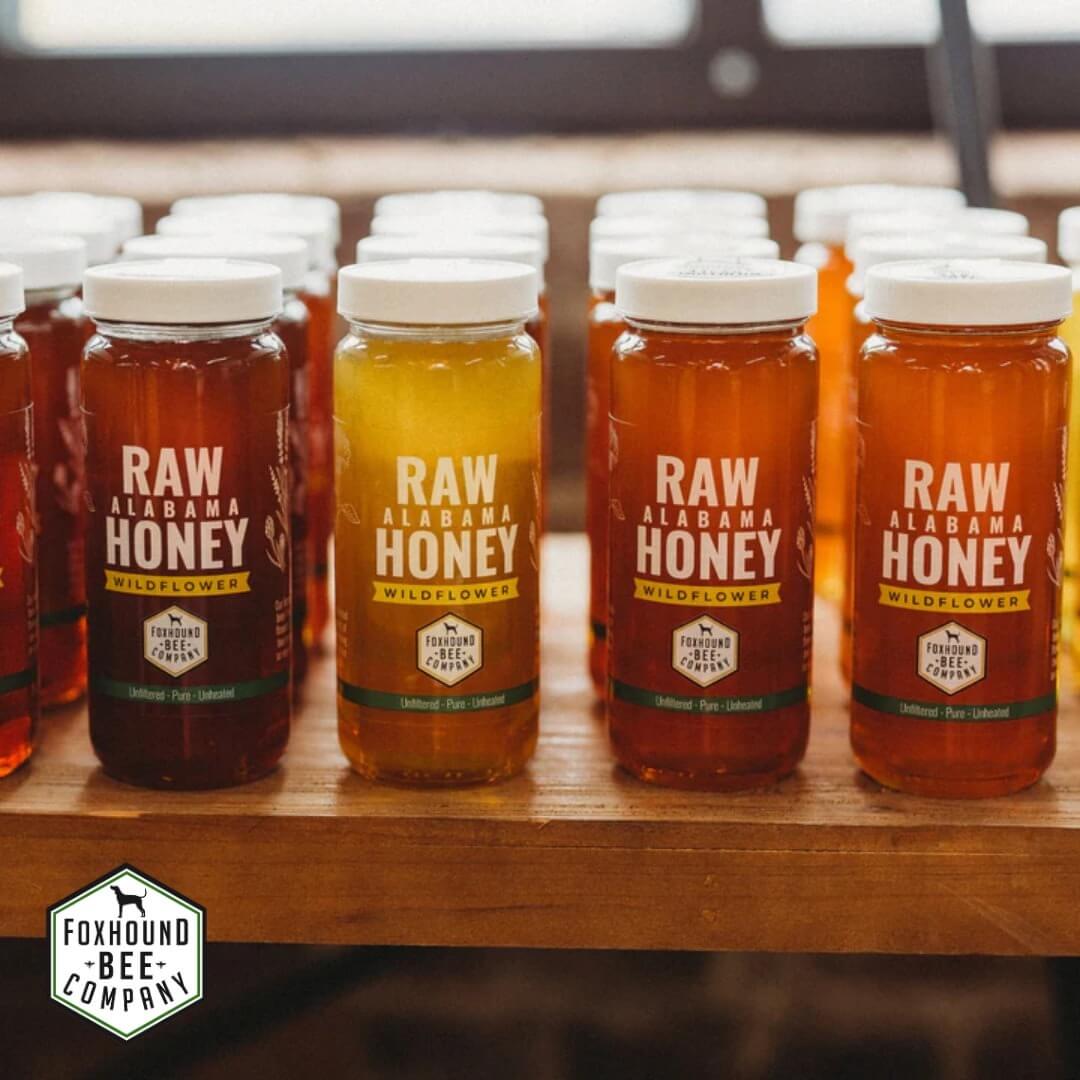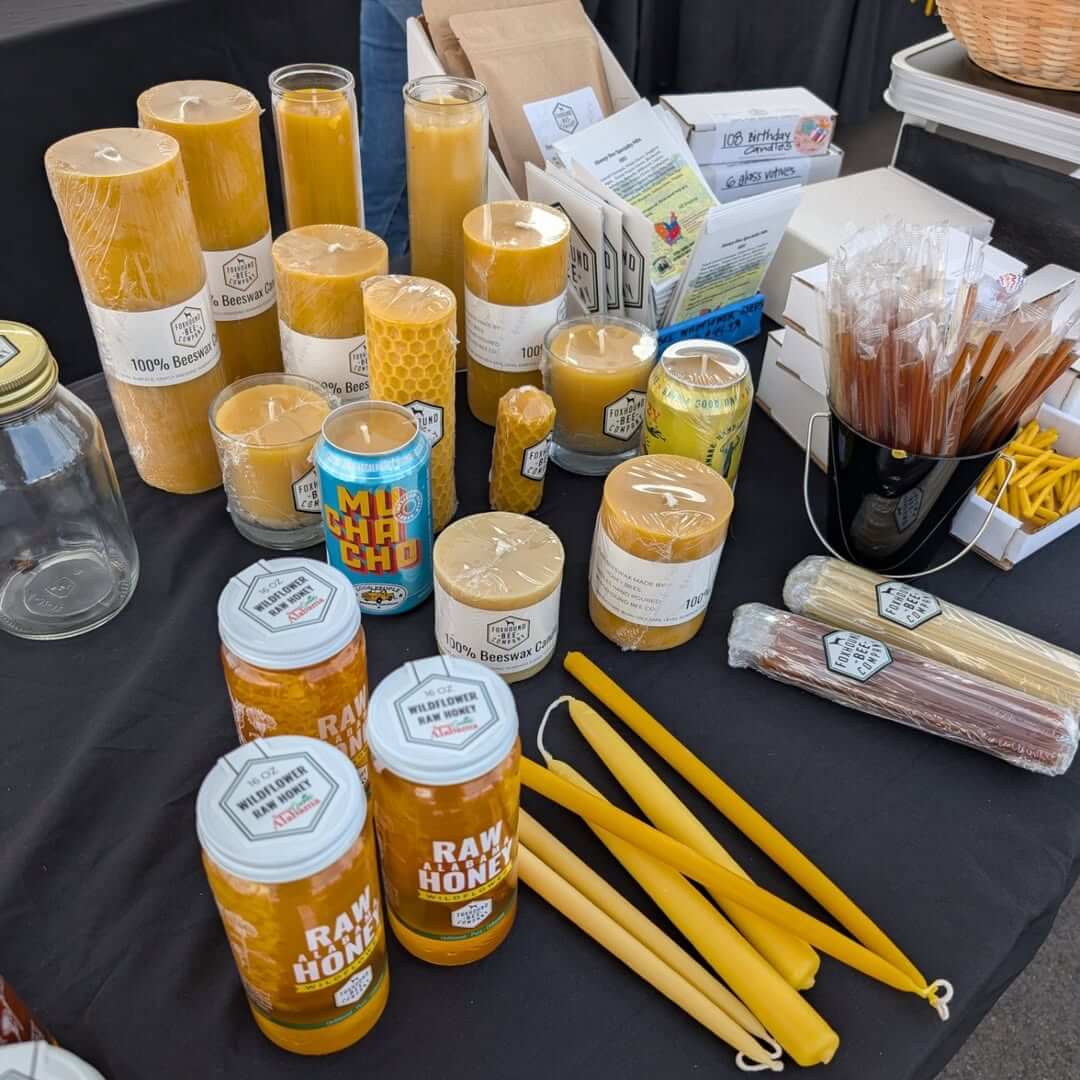Meet the Master Beekeeper at BHAM’s Foxhound Bee Company
A former art teacher turned Master Beekeeper at Foxhound Bee Company, Amy Seiber lives by the motto: teacher first, beekeeper second, businessperson third. She shares her knowledge freely, helping both novice and seasoned apiarists thrive. When she’s not offering advice or troubleshooting hive issues, she’s hand-pouring beeswax candles, blending her love of art with her passion for bees. Get this know this FACE of Birmingham!

I’ve lived in Hayden, Alabama, since 1979, except for when I was in college at UAB. I am 53 and happily married to Jason Seiber. Between us, we have three amazing kids, four dogs, five cats, seventeen chickens, and eight beehives.
I’m an Alabama Master Beekeeper, Master Gardener, yoga teacher, retired art teacher, and artist. I’m currently the secretary for the Alabama Beekeepers Association.
I had an ant farm when I was a kid, and I was fascinated by their social structure, anatomy, and efficiency. I think that was the beginning — the seed that grew the beekeeper in me. When I was growing up, there was an outhouse on our farm that honeybees liked to live in. A beekeeper named Jeff Moss would come and remove them. That was my first exposure to honeybees.
In 2014, Jeff became my beekeeping mentor when I was given a hive and some basic equipment by an acquaintance who was moving. I would not be a beekeeper today without encouragement and guidance from Jeff. I definitely would have given up!

How did you find your way to Foxhound?
I was a high school art teacher for 26 years. In 2021, I was thinking about retiring when I saw an Instagram post that Adam Hickman made about opening a retail beekeeping store in downtown Birmingham called Foxhound Bee Company. I contacted him to see if he’d be hiring anyone to help. I had bees, and I thought working for him would be a great way to become part of a beekeeping community, learn more about beekeeping, and grow. (As well as a fun way to spend my retirement.)
I worked on Saturdays while I decided whether to retire, and I enjoyed it so much that I retired from teaching in May 2021 and started working at Foxhound on more than just Saturdays.
I just love the whole idea of Foxhound Bee Company, and I want to help however I can. Adam is inspired and inspiring. He’s always thinking ahead, and it’s been really interesting to learn from him about business and beekeeping. Brian Booth, the manager, is very knowledgeable and experienced in beekeeping, and all of the people working at Foxhound care about honeybees and the people who keep them.
Give us the scoop on Foxhound’s new beekeeping store and education space, opening this year.
Adam has always emphasized educational outreach as an important part of the business, and I think that has been a huge reason for his success. People come to the store or call us to ask questions and talk about issues they’re having, and we are there to help. Classes are an important part of what we do, too. We are there to mentor, guide, and encourage new beekeepers.
That focus has driven the design of the new store. We will have a classroom, an area for people to sit and talk about beekeeping, an observation hive, a pollinator garden, and outdoor apiary on site, and more room for the retail part of the store. There will be a room for making candles (my favorite thing to do) and extracting honey. We will have the space for classes and events we want to host.
We are not just a store; we are a community hub. Beekeepers know they can come to us for supplies, advice, and encouragement.

What is one thing you wish everyone understood about bees?
One of the coolest things I have come to understand about bees is that they are a superorganism. Each bee is an individual, but they all are part of the greater hive, and they all work together like one body for the good of that hive. One hive could theoretically live forever if it is able to overcome any diseases or pests that threaten it. As a beekeeper, I want to help them with that. Because I am their caretaker, I kind of get to be part of the superorganism, too.

What is one thing you want Birmingham readers to know about the work Foxhound Bee Company does?
We want to help beekeepers and bees. If we can educate and help beekeepers, that ultimately helps the bees.
We have good, local raw honey and 100% beeswax candles. We often have pollen, as well. We can be your one-stop beekeeping shop.
What do you like to do when you’re not working?
I’m an artist; I like to paint, make pottery, and doodle in a sketchbook. I also volunteer at Restoration Garden, a non-profit native plant nursery that supports Friends of the Locust Fork River. I like to plant flowers and grow tomatoes, and I teach a yoga class and take gym classes at Armstrong Fitness and Nutrition in Hayden. I need muscles for picking up beehive boxes! I love to play with my dogs and read or listen to books whenever I have time.

Who or what is inspiring you right now?
We Need Your Art: Stop Messing Around and Make Something by Amie McNee. I’m in the middle of this book, and it’s really making me want to be more creative.
Hilary Kearney is my beekeeping hero. Her books about bees are the best. QueenSpotting and Heart of the Hive are my favorites. She posts amazing pictures of bees on her Instagram feed.
What’s the best piece of advice you’ve ever received?
Brené Brown spoke on one of her podcasts about the importance of believing that people are doing the best they can. If you can do this, you will be more compassionate and not get angry. I know I am always trying to do the best I can, and I appreciate the people who have given me grace when I’ve messed up.

댓글
댓글 쓰기